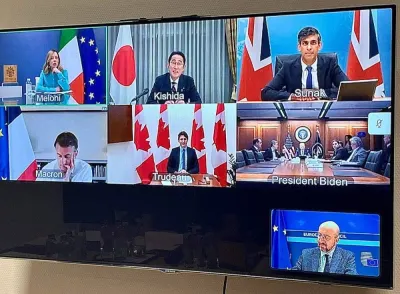Trump’s decision to ditch the accord and reimpose sanctions on the Islamic republic risks overturning years of painstaking diplomacy, worsening instability in the Middle East and threatens foreign companies’ business in Iran worth billions of dollars.
Iran reacted furiously, with lawmakers burning a US flag in the Iranian parliament. But its regional rivals Saudi Arabia and Israel applauded the US move.
Iran’s supreme leader Ayatollah Ali Khamenei said Iran too should quit the nuclear deal unless Europeans offer solid guarantees that trade relations would continue.
“If you don’t succeed in obtaining a definitive guarantee – and I really doubt that you can – at that moment, we cannot continue like this,” he told Iran’s government in a televised speech.
French President Emmanuel Macron and Iran President Hassan Rouhani agreed yesterday to work toward the continued implementation of the nuclear deal despite the US decision, which Macron called “a mistake”.
Other signatories, including major trade partner Beijing, promised to work to keep the accord in place.
Meanwhile, US President Donald Trump warned of “very severe consequences” if Iran resumed its nuclear programme.
Asked how he would respond if Tehran restarted its nuclear efforts, Trump threatened that “Iran will find out.”
“I would advise Iran not to start their nuclear programme; I would advise them very strongly,” the US president told reporters at the White House. “If they do, there will be very severe consequences.”
China insisted it would maintain “normal economic and trade exchanges with Tehran” and “continue to devote itself to safeguard and implement the deal”.
Beijing expressed regret about the US decision to withdraw from the Iran nuclear deal signed in 2015.
Chinese Foreign Ministry Spokesperson Geng Shuang said the implementation of the agreement would help maintain the international nuclear disarmament process, promote peace and stability in the Middle East.
Earlier, German Chancellor Angela Merkel said European signatories would “do everything” to ensure the agreement’s parameters remain in place.
Russian President Vladimir Putin yesterday welcomed Israeli Prime Minister Benjamin Netanyahu for talks, after expressing his “deep concern” over Trump’s withdrawal from the Iran nuclear deal.
Ahead of the meeting, Putin had said he would discuss “problems in the region,” saying that “the situation unfortunately is very acute”.
In comments to his national Security Council, Putin expressed his “deep concern” over Trump’s decision announced on Tuesday and stressed the importance of the accord with Iran.
Kuwait said it followed up with great interest US President Donald Trump’s announcement of withdrawing from Iran’s nuclear deal.
Kuwait news agency KUNA quoted a Foreign Ministry source as saying in a statement that Kuwait had welcomed the agreement when it was announced in 2015, especially that it was endorsed by the UN Security Council’s Resolution 2231.
“Also, Kuwait then reiterated that the pact would contribute to boosting regional security and stability, despite realising it did not fully respond to worries and concerns of countries in the region resulting from Iran’s negative conduct with these states.”
Saudi Arabia and its Gulf allies saw the development as a political victory over Iran, their rival for regional influence.
Saudi Arabia, the United Arab Emirates (UAE) and Bahrain swiftly backed Trump’s decision to reimpose sanctions on Tehran, reflecting their concern about Iran’s ballistic missile programme and support for militant groups.
Oil prices rose about 3% yesterday and hit fresh 3-1/2 year highs after a bigger-than-expected drawdown in US oil inventories extended gains from the US decision to quit a nuclear deal with Iran.
The US pulling out of the deal made investors nervous about rising risks of conflict in the Middle East and about oil supplies in a tight market.
News of the deal prompted a volatile trading session on Tuesday in the heaviest volumes for front-month US crude futures since November 30, 2016. (Agencies) Page 11



